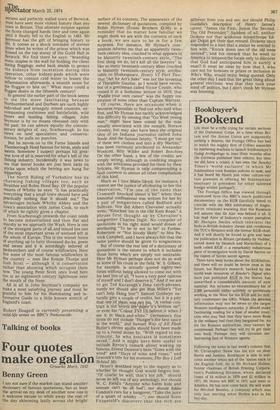Talking of books
Four quotes
make one gallon
Groucho Marx 1932
Benny Green
I am not sure if the market can stand another dictionary of famous quotations, but at least the arrival on my desk of another new one is a welcome excuse to while away the rest of the day skimming lazily across the bright
surface of its contents. The appearance of the newest dictionary of quotations, compiled by Robin Hyman (Evans Brothers £2.80) is a reminder that no matter how familiar we might think we are with the contents of such a book, we are sure to be in for a few surprises. For instance, Mr Hyman's compilation informs me that an apparently twentieth century idea, couched in what appears to be blatantly twentieth-century style,, "The first thing we do, let's kill all the lawyers" is, like so many twentieth-century ideas couched in blatantly twentieth-century style, attributable to Shakespeare, Henry VI Part Two; that "Art for Art's Sake" was not the invention of Theophile Gautier, as I would have sworn, but of a gentleman called Victor Cousin, who coined it at a Sorbonne lecture in 1818; that 'Paddle your own canoe" was the happy inspiration of none other than Captain Marryat.
Of course, there are occasions when it becomes impossible to find out who said what first, and Mr Hyman has tacitly acknowledged this difficulty by owning that "Go West young man," might have been coined by the man usually associated with the remark, Horace Greeley, but may also have been the original idea of an Indiana journalist called John Soule. Abd the famous fatuity, "I must get out of these wet clothes and into a dry Martini," has been variously attributed to Alexander Woolcott, Billy Wilder and Robert Benchley. On the other hand, a few of the credits are simply wrong, although in crediting singers with the witticisms provided for them by their lyricists, Mr Hyman is only compounding a fault common to almost all other compilations of this kind.
Much as I love Marie Lloyd, for instance, I cannot see the justice of attributing to her the observation,. "I'm one of the ruins that Cromwell knocked about a bit" when that immortal confessional was written for her by a pair of songwriters called Bedford and Sullivan. Nor did Albert Chevalier actually write, "Knocked 'em in the Old Kent Road," a phrase first thought up by Chevalier's songwriter Charles Ingle. No compiler of quotations in his right mind would dream of attributing "To be or not to be" to ForbesRobertson or "Not bloody likely" to Mrs Patrick Campbell, and I have always felt that the same justice should be given to songwriters.
But of course the real test of a dictionary of quotations is the extent to which it includes those items which are simply not omittable. Here Mr Hyman perhaps does not do so well as some of his rivals in the field. W. S. Gilbert, for example, is actually quoted eighty-two times without being allowed to come out with his best line of all, "I have a very poor opinion of myself and I don't deserve it." And if we are to get Ted Kavanagh's Itma catch-phrases, surely we should also get Max Miller's "Yer can't help liking him"? Samuel Goldwyn naturally gets a couple of credits, but it is a pity that one of them was Apt his, "A verbal contract is not Wcirth tkiertap'er it's written on"; or even his "Colour TV? I'll believe it when I see it in black-and-white." Cervantes's five items do not include "Hunger's the best sauce in the world," and Samuel Way of All Flesh Butler's eleven squibs should have been made up to a round dozen by, "With regard to matrimony, he who hesitates is sometimes saved." And it might have been useful to include Byron's remark about waking up famous, Ernest Dowson's lines "Gone with the wind" and "Days of wine and roses," and Leacock's title for his memoirs, The Boy I Left Behind Me.
Heine's deathbed reply to the inquiry as to whether he thought God would forgive him, "Of course he will; that's his job," should never be left out of any anthology; nor should W. C. Field's "Anyone who hates kids and animals can't be all bad"; nor should Eddie Condon's cure for a hangover, "Take the juice of a .quart of whisky ..."; nor should Scott Fitzgerald's discovery that the rich are differ-ent from you and me; nor should Philip Guedalla's description of Henry James's career, "James the First, James the Second, The Old Pretender." Saddest of all, neither Dickens nor that acidulous misanthrope Edgar Degas get their due reward. Dickens once responded to a hint that a statue be erected to him with, "Knock down one of the old ones instead"; and his remark that he went to America to lampoon the locals only to discover that God had anticipated him is surely a must? It must be clear by now that I, who care not for honours or prizes or inclusion in Who's Who, would enjoy being quoted. Only the other day I said that the great thing about general elections was that they took your mind off politics, but I don't think Mr Hyman was listening.


































 Previous page
Previous page